Question-------------------------
Followup To
Question -
i just got my second parrotlet and she is not tame. she was hand fed but she is not finger trained and bites REALLY HARD! how can i help her to like me more and not to bite. can yo uhelp please, if not can you tell me who can? thanx.
Answer -
Hi, Rebecca. Thanks for posting your question. You don't mention how old the second parrotlet is...age does make a difference when trying to tame/retame a bird. A bird can be handfed and tamed when young, but if the interaction between bird and human doesn't continue on a daily/regular basis as the bird grows older, tameness can diminish/disappear, particularly if there are other birds in the same cage/in the vicinity (most birds prefer other birds to humans).
If you just got this bird, you must give it time to settle into it's new surroundings before doing much with it. It's quite traumatizing for a bird to move from one location to another (she's stressed out). She's biting because biting is a defense mechanism and she feels threatened. It is being defensive at the moment because it doesn't know you or understand what has happened/why it doesn't recognize where it is anymore. Give it time to get used to it's new surroundings, you, and it's new routine before interacting with it. It's OK to talk to her, care for her, give her her favorite treats, etc., but let her settle down some before trying to retame her. Take things slow, speak gently to her and often to try and calm her, interact with her as much as possible when you're at home, at first without touching her at all until she's ready for you to touch her (you need to take this at her speed, not yours). If she was not finger trained as a baby, you'll have to work with her to teach her this once she's calmed down in her new home (while the bird sits on a perch, press your finger to her chest and give the "up" command pressing against her chest until she steps up on your finger). If you have her in a cage with another parrotlet (you mentioned this was your second parrotlet), the process will be harder because she will prefer the company of the other bird to you. Birds make the best pets when they are the only bird in the home. It also helps to keep the bird's wings clipped, as this requires them to rely solely on you for their mobility, and they can't fly away when you try working with them.
Chrys
she is only 8 weeks old. in just the one day we had her she is getting better already. she just dose not know us yet i think. she gets up on your finger now but you have to corner her first you know what i mean. she has not bitten me all day today. my other parrotlet is a male who is about 15 weeks old. they already get along and talk to eachother through the cage. we took them both out in nutrual territory and they began pruning eachother. he also stated regujitating food and feeding it to her, is that a bad thing that they were doing that or htat we had them out at the same time? i think she is learning from him but i also think he has learned some of her bad habbits. how can i stop him from learning from her? thank you again for your time. rebecca
AnswerHi, Rebecca. I'm glad your parrotlet is doing better! At just 8 weeks of age, she is scared (you're correct...she doesn't know you yet), but it's good that she is this young. She won't be stressed out as long as an older bird would be, and you will be able to teach her the way you want (it's harder to "retrain" a bird the older it is).
It is absolutely ok for you to let them both out together. However, like I stated, birds prefer other birds to humans, so you will need to interact with them both as much as possible in order for them to remain tame. They do like each other if they are preening one another.
If the 8-week old parrotlet is still begging for food, the 15-month old male might be feeding her because he knows she is so young. However, in older birds and older young birds, when a male bird regurgitates food to a female, this is the beginning of a bonding process. Bonding has to occur before a male and female become a good pair for breeding purposes. When the female is sitting on eggs, the male will feed her in the nest so she doesn't have to come off the eggs (eggs have to remain a certain temperature in order to develop or incubate properly). Also, the male may/will feed a female when the babies are young so she can sit on them to keep them warm (some species of male birds also help feed the young by regurgitating food for them). If you're planning on breeding them, this is a good thing! If you don't plan on breeding them, this is still a good thing, but don't put any type of nestbox up for them so they have a place to lay eggs. I must stress that if you want them to remain tame, you must pay attention/interact with them every day together and separately or some of the tameness will go away (they will prefer each other to you if you don't stay a main part of their everyday life).
There is nothing you can do to keep them from learning from each other (good and bad habits), except to keep them completely separate from each other all the time! Mimicing is how they learn (they mimic what their parents do...this is how the parents teach them how to survive in the world). Also, this is how birds learn to speak...they mimic what they hear (what their human companions teach them).
I'm glad things are working out better. Come back if you have more questions.
Chrys

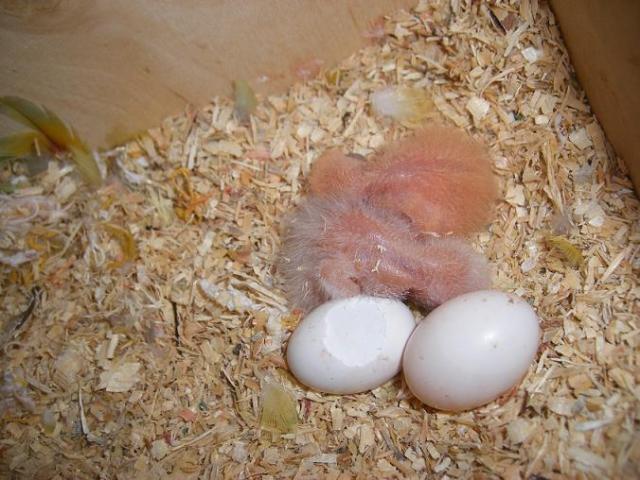 Eggs! :(
QuestionBroken Egg
QUESTION: I understand lovebi
Eggs! :(
QuestionBroken Egg
QUESTION: I understand lovebi
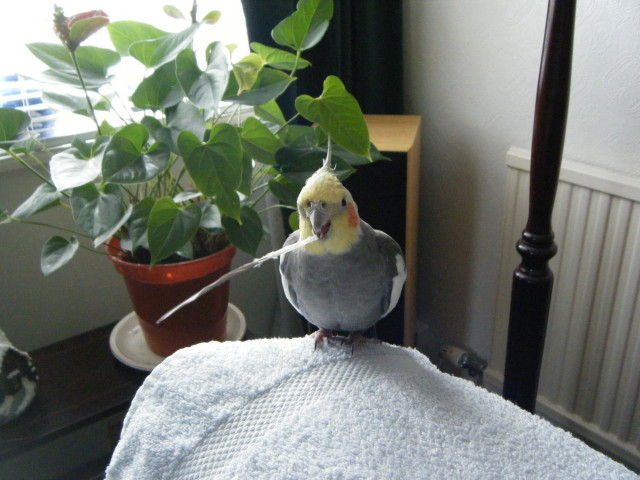 boris the cockatiel
Question
boris
Hello , I have a male cockatiel called b
boris the cockatiel
Question
boris
Hello , I have a male cockatiel called b
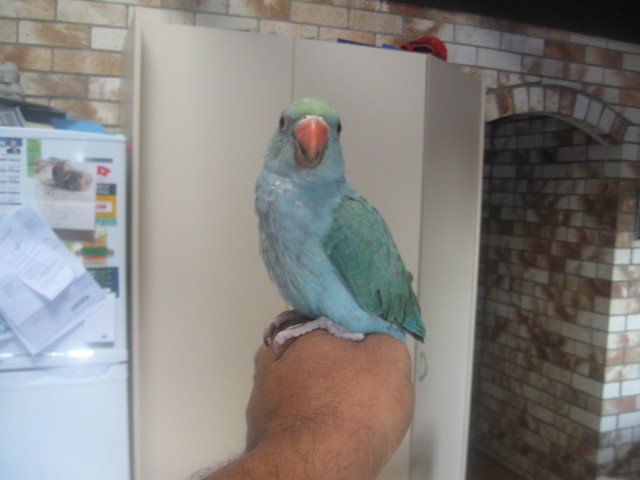 Color of my indian ringneck
Question
Boots
I have an eleven week old male ringneck
Color of my indian ringneck
Question
Boots
I have an eleven week old male ringneck
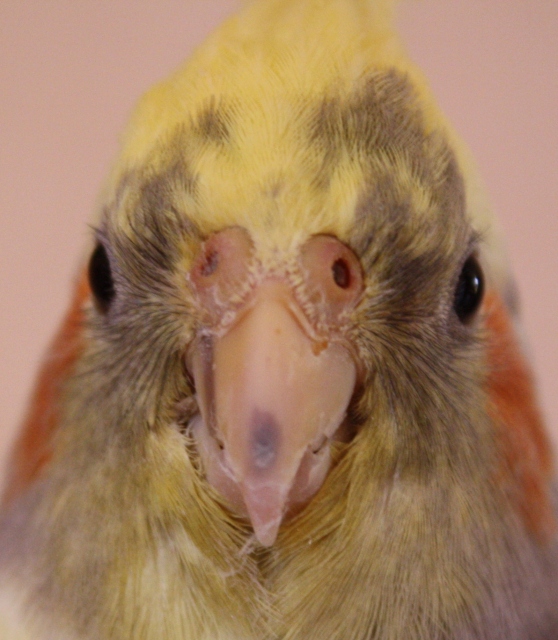 Bruise-like discoloration of beak (Cockatiel)
QuestionSasha
QUESTION: Our Cockatiel has develo
Bruise-like discoloration of beak (Cockatiel)
QuestionSasha
QUESTION: Our Cockatiel has develo
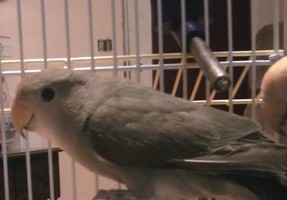 My odd lovebird
Question
Honey
I have a love bird that is approximately
My odd lovebird
Question
Honey
I have a love bird that is approximately